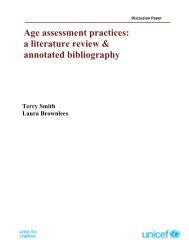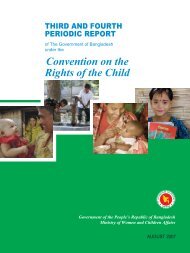Government-funded programmes and services for vulnerable - Unicef
Government-funded programmes and services for vulnerable - Unicef
Government-funded programmes and services for vulnerable - Unicef
Create successful ePaper yourself
Turn your PDF publications into a flip-book with our unique Google optimized e-Paper software.
Department of Home Affairs<br />
Mobile units<br />
These were established in 2006 to reach into impoverished <strong>and</strong> marginalised rural<br />
communities. They have proven to be very useful in filling the rural service delivery gap.<br />
However, there are a number of problems in accessing the mobile units <strong>and</strong> the <strong>services</strong><br />
they offer. These include:<br />
● insufficient consultation with communities about where mobile <strong>services</strong> should<br />
be sent <strong>and</strong> a lack of accessible <strong>and</strong> accurate in<strong>for</strong>mation about where <strong>and</strong> when<br />
mobile service delivery units will be available in rural areas. For example, in<br />
the Ratlou district, reliance is placed on a social network <strong>for</strong> the distribution of<br />
in<strong>for</strong>mation about the days on which mobile trucks will visit a particular area. The<br />
social network is made up of community development workers, ward councillors,<br />
ward committees, tribal authorities, chiefs <strong>and</strong> local pension committees. Social<br />
networks of this kind cannot be relied on to convey the in<strong>for</strong>mation (Peters &<br />
Williams 2009);<br />
● insufficient numbers of mobile units;<br />
● no dedicated staff <strong>for</strong> the mobile units;<br />
● equipment in the units is often out of order <strong>and</strong> this means that documents cannot<br />
be issued. All that they can do is take the application <strong>and</strong> the applicant must still<br />
travel to the nearest fixed service point to collect the documents, defeating the<br />
objective of the mobile units (Giese & Smith 2007).<br />
Hospital birth registrations<br />
The DoHA has provided equipment <strong>and</strong> staff to 110 hospitals across South Africa with<br />
maternity <strong>and</strong> obstetric units to process immediate birth registration <strong>for</strong> newborn babies. 17<br />
Young children<br />
A 2005 study in KwaZulu-Natal found that birth registration was poorest among very<br />
young babies (Dove & Naude 2005). In the research sample, 38 per cent of children<br />
between the ages of 0–3 months did not have birth certificates, 19 per cent of children<br />
between 3–12 months were not registered, 16 per cent of children 1–15 years did not<br />
have birth certificates <strong>and</strong> 13 per cent of children over the age of 15 years had not been<br />
registered.<br />
These findings regarding young babies in poor rural communities were confirmed in a<br />
study conducted in 2009 in the rural communities of Mbizana in the Eastern Cape <strong>and</strong><br />
Ratlou in the North West province (Peters & Williams 2009). The areas were chosen<br />
because of their predominantly rural character <strong>and</strong> high poverty levels. The take-up of<br />
the CSG in these areas is very low. Only 56 per cent of children that qualify <strong>for</strong> the CSG<br />
in Mbizana receive it, <strong>and</strong> this figure is even lower in Ratlou, where only 37 per cent<br />
of children receive it. Generally, there is a delay in accessing the CSG <strong>for</strong> children from<br />
birth to three years. The primary reason <strong>for</strong> the low levels of access to the grant is lack of<br />
enabling documents.<br />
Reasons <strong>for</strong> very young children’s poor access to enabling documents<br />
The reasons <strong>for</strong> especially young children not having birth certificates are diverse.<br />
However, a common theme is the difficulty their mothers <strong>and</strong> caregivers experience in<br />
obtaining the supporting documents necessary to register the birth of the baby. This is<br />
17 Acting Deputy Director-General: Civic Services, 2008; available at http://www.pmg.org.za/report/20080801-accesseducation-children-special-needs-birth-certificates-<strong>and</strong>-id-doc<br />
15
















